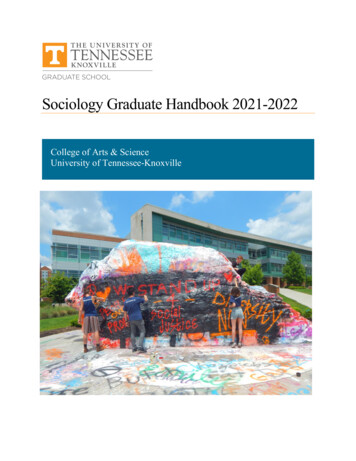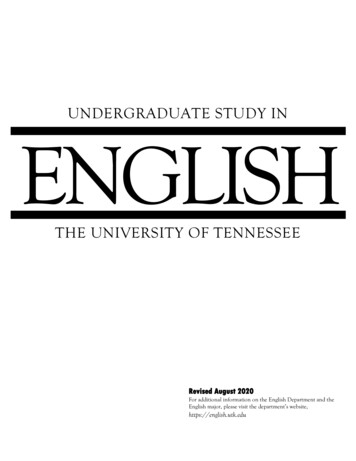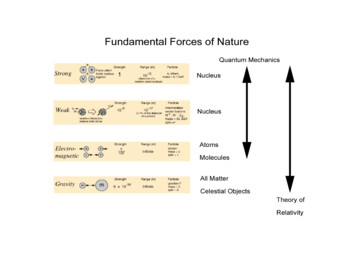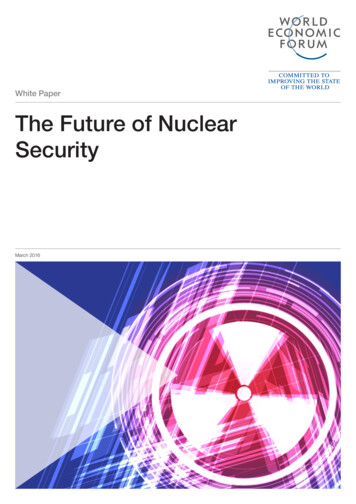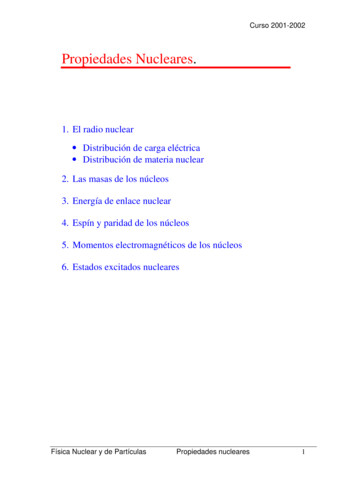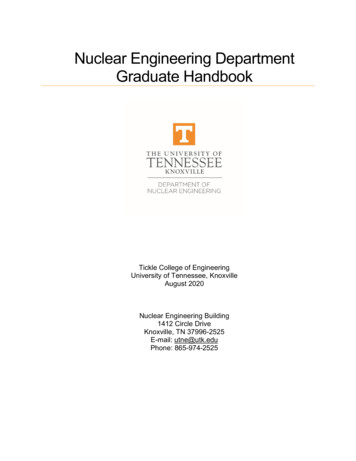
Transcription
Nuclear Engineering DepartmentGraduate HandbookTickle College of EngineeringUniversity of Tennessee, KnoxvilleAugust 2020Nuclear Engineering Building1412 Circle DriveKnoxville, TN 37996-2525E-mail: utne@utk.eduPhone: 865-974-2525
Table of Contents1MESSAGE FROM THE DEPARTMENT HEAD . V2INTRODUCTION .13ADMISSION REQUIREMENTS & APPLICATION PROCEDURES .24FINANCIAL SUPPORT .34.14.24.34.44.5DEPARTMENTAL GRADUATE ASSISTANTSHIPS .3FUNDED GRADUATE STUDENT PERFORMANCE EXPECTATIONS .4OTHER FINANCIAL AID .4EXTERNAL FELLOWSHIP AND SCHOLARSHIP OPPORTUNITIES .5TRAVEL SUPPORT .75 GRADUATE STUDENT ASSISTANT RESPONSIBILITIES, DUTIES, AND MENTORSHIPEXPECTATIONS.75.1 PERFORMANCE EXPECTATION DOCUMENTS .85.2 MENTORSHIP EXPECTATIONS .95.3 GRADUATE STUDENT SUPPORT .105.3.1 NUCLEAR ENGINEERING GRADUATE STUDENT ASSEMBLY (NEGSA) . 105.3.2 UNIVERSITY OMBUDSPERSON. 105.3.3 OTHER UNIVERSITY RESOURCES . 116REGISTRATION, ADVISING AND DEGREE PROGRESSION .116.1 REQUIRED COURSE LOADS .116.1.1 SUMMER REGISTRATION REQUIREMENTS: . 126.1.2 GRADUATE STUDENT SEMINAR REGISTRATION REQUIREMENT . 136.1.3 PHD NE 600 RESEARCH CREDITS . 136.2 COMPREHENSIVE EXAM AND THE PHD COMMITTEE.147DEGREE REQUIREMENTS .15
7.67.6.17.6.27.6.3NUCLEAR ENGINEERING MAJOR, PHD .16PHD REQUIREMENTS . 16PHD PROCESS AND FORMS . 17NUCLEAR ENGINEERING MAJOR, MS .18MS REQUIREMENTS. . 18MS PROCESS AND FORMS . 19CONCURRENT MASTER'S DEGREE PROGRAM . 19MS DEFENSE COMBINED PHD PROPOSAL OPTION . 20FIVE-YEAR BS-MS PROGRAM, NUCLEAR ENGINEERING MAJOR . 20MS IN MEDICAL PHYSICS .21DUAL MS-MBA PROGRAM – NUCLEAR ENGINEERING .23RELIABILITY AND MAINTAINABILITY ENGINEERING, MS – NUCLEAR ENGINEERING CONCENTRATION. 23GRADUATE CERTIFICATES AND CONCENTRATIONS .23MEDICAL PHYSICS GRADUATE CERTIFICATE. 23NUCLEAR SECURITY SCIENCE AND ANALYSIS GRADUATE CERTIFICATE . 24RELIABILITY AND MAINTAINABILITY ENGINEERING GRADUATE CERTIFICATE – NUCLEAR ENGINEERINGCONCENTRATION. 257.6.4 ENERGY SCIENCE AND ENGINEERING CONCENTRATION . 257.6.5 RADIATION INSTRUMENTATION INTERDISCIPLINARY GRADUATE EDUCATION . 267.6.6 GRADUATE CONCENTRATION IN NUCLEAR SAFETY . 267.6.7 GRADUATE CONCENTRATION IN RADIOLOGICAL ENGINEERING . 267.7 COMMITTEE REQUIREMENTS.277.7.1 MASTER'S COMMITTEE . 277.7.2 DOCTORAL COMMITTEE . 277.8 TIME LIMITS FOR COMPLETION OF DEGREE .287.9 PHD RESIDENCE REQUIREMENT .2888.18.28.38.48.58.69ACADEMIC STANDARDS AND ACADEMIC STANDING .29ACADEMIC PROBATION.29ACADEMIC DISMISSAL .29ACADEMIC DISHONESTY.29GRADE OF INCOMPLETE .30APPEAL PROCEDURE .30ACADEMIC POLICIES FOR THE ADMINISTRATION OF GRADUATE ASSISTANTSHIPS.31LINKS TO IMPORTANT RESOURCES .31
10APPENDICES.33
1 Message from the Department HeadWelcome to the University of Tennessee’s Nuclear Engineering (UTNE) Department.The information provided in this graduate handbook is intended to be one source to helpstudents navigate the policies, procedures, and practices surrounding graduate school inthe Nuclear Engineering Department. It is certainly not all inclusive, but important linkswill be provided to steer students towards other valuable information sources. We hopeyou will find this document useful.The UTNE department’s strengths include an outstanding faculty of skilled teachers andproductive researchers; close ties with the Oak Ridge National Laboratory, Y-12 NuclearSecurity Complex, UCOR, nuclear utilities, and international research collaborations;attractive graduate assistantship and fellowship opportunities; and outstanding researchfacilities. In addition to traditional nuclear engineering, concentrations in radiologicalengineering are also offered at all levels incorporating health physics, medical physics,and radiological assessment. The UT Nuclear Engineering program hosts the largestnuclear engineering PhD program in the United States, and our graduate program isconsistently ranked among the top ten in the nation by U.S. News and World Report.The faculty, students, and staff of the UTNE department are committed to actionableitemsthatsupportAllyship,SocialJustice, Diversity,&Inclusion: ice-diversity-inclusion/ .If you desire additional information, please contact us by email at utne@utk.edu.J. Wesley HinesPostelle Professor, Chancellor Professor, and Head
2 IntroductionEstablished in 1957, the UT Department of Nuclear Engineering is one of theoldest and most prestigious programs in the United States. The Nuclear EngineeringDepartment strives to develop and maintain a nationally and internationally recognizedprogram that promotes a passion for understanding and applying the knowledge ofnuclear science and engineering and develops the next generation of technical leadersof the global nuclear enterprise. Our faculty consists of diverse research expertise;many worked in national labs and/or in industry and are considered to be national andglobal leaders in their respective fields. Students gain expertise as scientists andengineers who advance radiation detection, nuclear security, nuclear fuel cycles, fusiontechnology, reliability and safety, health physics, and other areas of basic research. Visitthe Graduate Admissions website https://gradschool.utk.edu/admissions/ and theGraduate Catalog https://catalog.utk.edu/misc/catalog list.php?catoid 2 for moreinformation on applying to the Nuclear Engineering Department’s graduate program.The Department of Nuclear Engineering offers programs leading to the Master ofScience and Doctor of Philosophy degrees, and several Graduate Certificates. Studentsmay elect a traditional nuclear engineering program focusing on fission energy or aradiological engineering concentration, which prepares students for careers in theradiation safety field (health physics). Beginning in Fall 2019, there is also a medicalphysics program. All programs are designed for graduates of accredited undergraduateprograms in engineering, physics, chemistry, or mathematics.To serve the mission and vision of the Graduate School and preserve theintegrity of graduate programs at the University of Tennessee, Knoxville, informationrelated to the process of graduate education in each department is to be provided for allgraduate students.Based on Best Practices offered by the Council of Graduate Schools, it isimportant that detailed articulation of the information specific to the graduate degreesoffered in each department/program be disseminated.The Department Graduate Handbook does not deviate from established GraduateSchool Policies http://tiny.utk.edu/grad-policies noted in the Graduate Catalog, butrather provides the specific ways in which those policies are carried out. The purpose of the Graduate Handbook is to provide Nuclear Engineering Departmentalspecific information in one document. This information is subject to change, and thisdocument will be updated annually. Graduate students are expected to be aware of and satisfy all regulations governingtheir work and study at the University. Students should be directed to the GraduateCatalog http://tiny.utk.edu/grad-catalog , to Hilltopics http://hilltopics.utk.edu/ , to thepublications on the Appeals Procedure erstanding-your-rights-and-obligations/, and to the graduate school forms website https://gradschool.utk.edu/forms-central/ for matters related to graduationrequirements.
The Nuclear Engineering Graduate Program Committee is responsible for activities suchas preparing the PhD qualification exam (considered the first part of the PhDcomprehensive exam), recruiting top domestic and international students, financialsupport recommendations, and annually updating the graduate handbook. TheDepartment Head appoints a Chairperson and at least two other members to theGraduate Program Committee. The Associate Head for Graduate Studies and Research, acting as the Director ofGraduate Studies, is Dr. Jason Hayward. The 2020-2021 Chair of the Graduate ProgramCommittee is Dr. Nicholas Brown, and the other members are Dr. Maik Lang and Dr.Richard Wood.3 Admission Requirements & ApplicationProceduresAdmission to the program requires a bachelor’s degree from a college or universityaccredited by the appropriate regional accrediting agency. A foreign degree must beequivalent to a US bachelor’s degree and must be accredited by its regional or nationalaccreditation agency.The decision for admission is based upon the applicant’s GPA, GRE scores, TOEFLscores (for applicants whose native language is not English), letters of recommendation,and research statement. College professors, research advisors, and summer internshipmentors who have first-hand knowledge of your academic and scholarly performanceand capabilities make good reference providers. We recommend that applicants exploreour research focuses and our faculty to investigate research topics that may be ofinterest and fit with applicants’ career goals http://ne.utk.edu/research/focus-areas/ .Prospective students are required to provide an essay describing their researchinterests.US degree holders must have earned a 3.0 out of a possible 4.0 GPA or a minimumof 3.0 during their senior year of undergraduate study. Foreign degree holders musthave earned a minimum of 3.0 on a 4.0 scale or other equivalent to a B average. If youhave completed previous graduate coursework, you must have a GPA of 3.0 on a 4.0scale or the equivalent. The average GPA of admitted students in recent years isbetween 3.6 and 3.7 on a 4.0 scale.Applicants must also take the GRE examination and submit test scores. GREquantitative, verbal, and analytical scores are one measure used to evaluate studentcapacity to successfully complete the MS and PhD programs. We do not publishminimum scores, but admission to the program is competitive. The recent average GREquantitative scores has been 162 (170 max), and the average GRE verbal score hasbeen 158 (170 max). For students requesting graduate assistantships (GRA and/orGTA), GRE averages are often higher than the averages for general admission into theprogram. A GRE analytical score of 4 or higher is recommended. These metrics and2
scores are intended to provide general guidance, and each application is evaluated bythe Graduate Program Committee and other faculty.Applicants whose native language is not English must submit TOEFL or IELTS testscores. To be fully admitted, applicants must submit a minimum score of 550 on thepaper-based TOEFL, 80 on the TOEFL iBT, or 6.5 on the IELTS. Applicants may beeligible for English Proficiency Conditional Admission.Admission to the program is through the Office of Graduate Admissions and onlineapplication procedures can be found at http://graduateadmissions.utk.edu/ .Application deadlines are given at https://ne.utk.edu/graduate-program/admissions/ .Meeting minimum standards does not guarantee admission to the program, and theentire package of submitted materials—GPA, GRE scores, letters of recommendation,and research statement—is considered holistically.All entering students must have, as a minimum, competency in mathematicsthrough ordinary differential equations, competency in atomic and nuclear physics, andcompetency consistent with an introductory course in nuclear engineering. If suchcompetencies do not exist, the student must take appropriate courses forundergraduate credit. In addition, students without a BS degree in nuclear engineering,or the equivalent, must take 433 (Radiation Protection) and 470 (Nuclear ReactorTheory I), both of which may be taken for graduate credit. Contact the department formore information at utne@utk.edu.The Graduate Catalog contains policy and procedure information related to thegraduate program http://tiny.utk.edu/grad-catalog .4 Financial SupportThe university is committed to providing quality education at a reasonable cost, anda number of programs have been developed to help graduate students finance theirstudies.If graduate students have 20-hour per week support (a 50% assistantship) such aswith a GRA, GTA/GRA, or other assistantship or fellowship that requires 20 hours perweek of work, they should not have additional work requirements outside of theUniversity during the academic year (from August – April). This means that a studenton a full GRA should not have an external job or perform external consulting work. Wemake this requirement because history has shown that graduate students who have a50% assistantship while attending UTNE and also try to maintain an additional externalwork load, are not successful in our program.4.1 Departmental Graduate AssistantshipsThe Nuclear Engineering Department has Graduate Teaching Assistant (GTA) andGraduate Research Assistant (GRA) openings with extremely competitive stipends,especially considering the low cost of living in Knoxville. The Nuclear EngineeringDepartment has the largest Nuclear Engineering PhD enrollment in the country and98% of those students are fully funded through the university and other external entities.The NE department strives to maintain a common pay scale for all graduatestudents. In FY2019, the NE annual graduate stipend was 30,000 for PhD students3
and 27,600 for MS students, divided evenly per twelve-month period ( 2500 or 2300per month).A student supported as a GTA, GRA, or split GTA/GRA will also receive a tuitionwaiver and student health insurance. Specifics related to pay scales and policy isprovided in the appendix as the GTA- GRA Pay Scale Policy.This is a very competitive salary compared with other Nuclear EngineeringDepartments in the country, especially when considering the cost of living in Knoxville,TN. The table below shows a comparison of the current value of a 30,000 yearlystipend at other Universities with top 10 ranked Nuclear Engineering programs:Cost of Living Comparison with Knoxville, TNCityKnoxville, TNAnn Arbor, MIBoston, MAMadison, WICollege Station, TXState College, PARaleigh, NCAtlanta, GAOakland, CAUniversityUniversity of TennesseeUniversity of MichiganMITUniversity of WisconsinTAMUPenn State UniversityNC StateGeorgia TechUC 22.5%11.8%32.1%6.9%14.1%60.3%Ref: CNN.com and areavibes.com (2017)4.2 Funded Graduate Student Performance ExpectationsStudents receiving financial support provided by the University of Tennessee, TickleCollege of Engineering, or Nuclear Engineering Department are expected to makeprogress towards their degree and meet the performance expectations of their graduateadvisors. If a student works as a GTA, they are expected to work on average 10 hoursper week and return graded assignments in a timely manner as defined by the courseinstructor. Failure to achieve set goals will result in a warning and areas ofimprovement will be identified. If performance does not improve within an agreed upontime, your Graduate Assistantship (tuition waiver and stipend) will be subject totermination. More detailed information on UTK assistantships and related policies canbe found at http://gradschool.utk.edu . More details on graduate student performanceand mentorship can be found in Section 5. Please review this, as it is essential tounderstand what is expected of you and others.4.3 Other Financial AidThe Graduate School has several assistantship and fellowship opportunities, someof which can be found here: stsfunding/graduate-assistantships/ . Another recent opportunity is the Science Alliance’sGraduate Advancement, Training, and Education program 4
ing-and-education/ . For otheropportunities, speak with your Major Professor.4.4 External Fellowship and Scholarship OpportunitiesNational organizations—such as the Department of Energy, the American NuclearSociety, and the National Academy for Nuclear Training—also offer excellent fellowshipand scholarship opportunities for nuclear engineering graduate students. Thedepartment, especially Your Major Professor, can provide information and assistance inapplying for these fellowships. An especially good time to apply for these fellowships isthe fall semester before you start graduate school or your first fall semester. Obtaining aprestigious fellowship is a benefit to your curriculum vitae, showing your ability to supportyour own work.US Department of Energy Student Programs and Internships, http://energy.gov/student-programs-and-internships , US Department of EnergyInternship Programs and Other OpportunitiesUS Department of Energy Nuclear Energy University Program, ation.aspx , The US Departmentof Energy, Office of Nuclear Energy Fellowship Program supports nuclear engineeringstudents conducting their graduate work engineering and science programs related tonuclear energy.NASA Space Technology Graduate Research Opportunity (NSTGRO), strf . For U.S. citizen andpermanent resident graduate students who show significant potential to contribute toNASA’s goal of creating innovative new space technologies for our Nation’s science,exploration and economic future; involves a generous stipend and an annual 6-10 weekvisiting technologist experience at NASA Centers and/or at nonprofit U.S. R&Dlaboratories.National Science Foundation (NSF) Graduate Research Fellowship Program(GRFP), https://www.nsfgrfp.org , The NSF Graduate Research Fellowship Programrecognizes and supports outstanding graduate students in NSF-supported science,technology, engineering, and mathematics disciplines who are pursuing research-basedMaster's and doctoral degrees at accredited United States institutions.DOE NNSA Stewardship Science Graduate Fellowship, https://www.krellinst.org/ssgf/how-apply , The Department of Energy National NuclearSecurity Administration Stewardship Science Graduate Fellowship (DOE NNSA SSGF)program provides outstanding benefits and opportunities to students pursuing a Ph.D. inareas of interest to stewardship science, such as properties of materials under extremeconditions and hydrodynamics, nuclear science, or high energy density physics. Thefellowship builds a community of talented and committed doctoral students that solvecomplex science and engineering problems critical to stewardship science (nationaldefense); fellows are provided opportunities to work with some of the nation's most5
sophisticated and powerful experimental and computational facilities at DOE NNSAnational laboratories.American Nuclear Society Scholarships, http://www.ans.org/honors/scholarships/ , The American Nuclear Society believes inrewarding its members for their academic, services and leadership excellence. To doso, scholarships are granted to qualified student members of ANS who havedemonstrated a high commitment to the standards set by the Society.Society of Women Engineers (SWE) Scholarships, s , SWE Scholarships supportwomen pursuing ABET-accredited bachelor or graduate student programs inpreparation for careers in engineering, engineering technology and computer science inthe United States.Roy G. Post Foundation Scholarship, http://www.roygpost.org/roygpost/Scholarship , the Roy G. Post Foundation is a nonprofit organization formed by his students, peers and protégés to provide scholarshipsto students to develop careers in the safe management of nuclear materials and toparticipate in the WM Conference.Rickover Fellowship Program in Nuclear Engineering, https://www.scuref.org/program/rfp-01/ , The program will assist in preparing studentsfor roles in naval nuclear propulsion and will support the broader objective of advancingfission energy development through the research efforts of the fellows.Nuclear Nonproliferation International Safeguards Graduate Fellowship Program, https://www.scuref.org/nnis/ , This fellowship provides financial support for exceptionalstudents pursuing technical doctoral research relevant to the field of internationalsafeguards. Participating universities foster partnerships between science/engineeringprograms and programs focused on nuclear nonproliferation and safeguards policy.Armed with both deep technical expertise and policy understanding, NNIS Fellows areprimed to take on the exciting and challenging work of international nuclear safeguards.SMART Scholarship administered by the National Defense Education Program, https://smartscholarshipprod.service-now.com/ , The Science, Mathematics AndResearch for Transformation (SMART) Scholarship-for-Service Program is anopportunity for students pursuing an undergraduate or graduate degree in Science,Technology, Engineering, and Mathematics (STEM) disciplines to receive a fullscholarship and be gainfully employed by the Department of Defense (DoD) upondegree completion.The NNSA Graduate Fellowship Program https://www.pnnl.gov/projects/ngfp identifies and develops the next generation of exceptional national security leadersto achieve the NNSA mission: Strengthening our nation through nuclear security. Itprovides fellowship support for one year while you are not working on your6
graduate studies, perhaps between MS and PhD work and after completion of yourdegree.4.5 Travel SupportThe Nuclear Engineering Department funds approximately 500,000 a year infaculty, staff and student travel. Departmental travel assistance should be provided bythe student’s Major Professor. Other travel support, such as the Graduate StudentTravel Fund http://gss.utk.edu/travel-awards/ , could also be utilized to attend nationaland international workshop and conferences. Selected conferences may also havetheir own sources of student travel support that are described on the conferencewebsite.5 Graduate Student Assistant Responsibilities,Duties, and Mentorship ExpectationsThe graduate student work-study experience is expected to be a transformationallearning and development process. Graduate school is an opportunity to learn what isexpected of you in your research and development career. It is also the place to learnand apply a new way of thinking about challenges and opportunities in the world, whilesimultaneously working safely, maintaining excellent ethical standards, and working inan atmosphere that cultivates mutual respect.The graduate student work-study experience is also unique to each student.Graduate school is a truly holistic opportunity to develop. Graduate students may seekmentorship and learning opportunities from their advisors, program managers,laboratory supervisors, postdocs, and each other. In addition, these same mentors alsolearn from the graduate students. Graduate school is also a place to explore academicopportunities, including mentorship of other less senior graduate and undergraduatestudents, as well as teaching opportunities. Graduate students should also expect to beencouraged to engage with unique learning opportunities such as attendance at aseminar, relevant conferences, etc. Graduate school is supposed to be an invigoratingand deeply rewarding experience that challenges a student in entirely new ways.In addition to a learning experience, graduate study is also a job, the first step ina career in research and development. Because of this, there are certain expectationsrequired of graduate students, who are typically tasked with delivering importantengineering work on a fixed schedule to financial sponsors. Graduate students mustwork independently and also work well with others to achieve important project goalswhile maintaining strong ethical standards.It is also essential for graduate students to carefully follow University procedures,University policy and also United States and international law. On some occasions,graduate study in nuclear engineering requires handling or working with sensitivematerials (e.g. related to security, export control, or business sensitive and proprietary7
information governed by a nondisclosure agreement). These materials require theutmost care and professionalism, while following applicable plans or rules. Additionally,sensitive experimental tools or export-controlled software require similar care andrespect. Projects associated with research and development institutions (e.g., OakRidge National Laboratory) or industry may have access requirements and institutionalpolicies that must be carefully followed. It is a privilege to have access to resources andfacilities, so please make the effort to comply with their requirements. GraduateTeaching Assistants must carefully comply with privacy laws regarding education, forexample Family Educational Rights and Privacy Act (FERPA).Graduate students must treat others with respect and dignity, and they deserveto be treated with respect and dignity. The objective of this section is to outline bestpractices in our Department for developing guidelines and expectations for graduatestudent performance as well as performance expectations for mentorship. In all cases,communicati
utne@utk.edu Phone: 865-974-2525 . Table of Contents . programs in engineering, physics, chemistry, or mathematics. To serve the mission and vision of the Graduate School and preserve the integrity of graduate programs at the University of Tennessee, Knoxville, information
